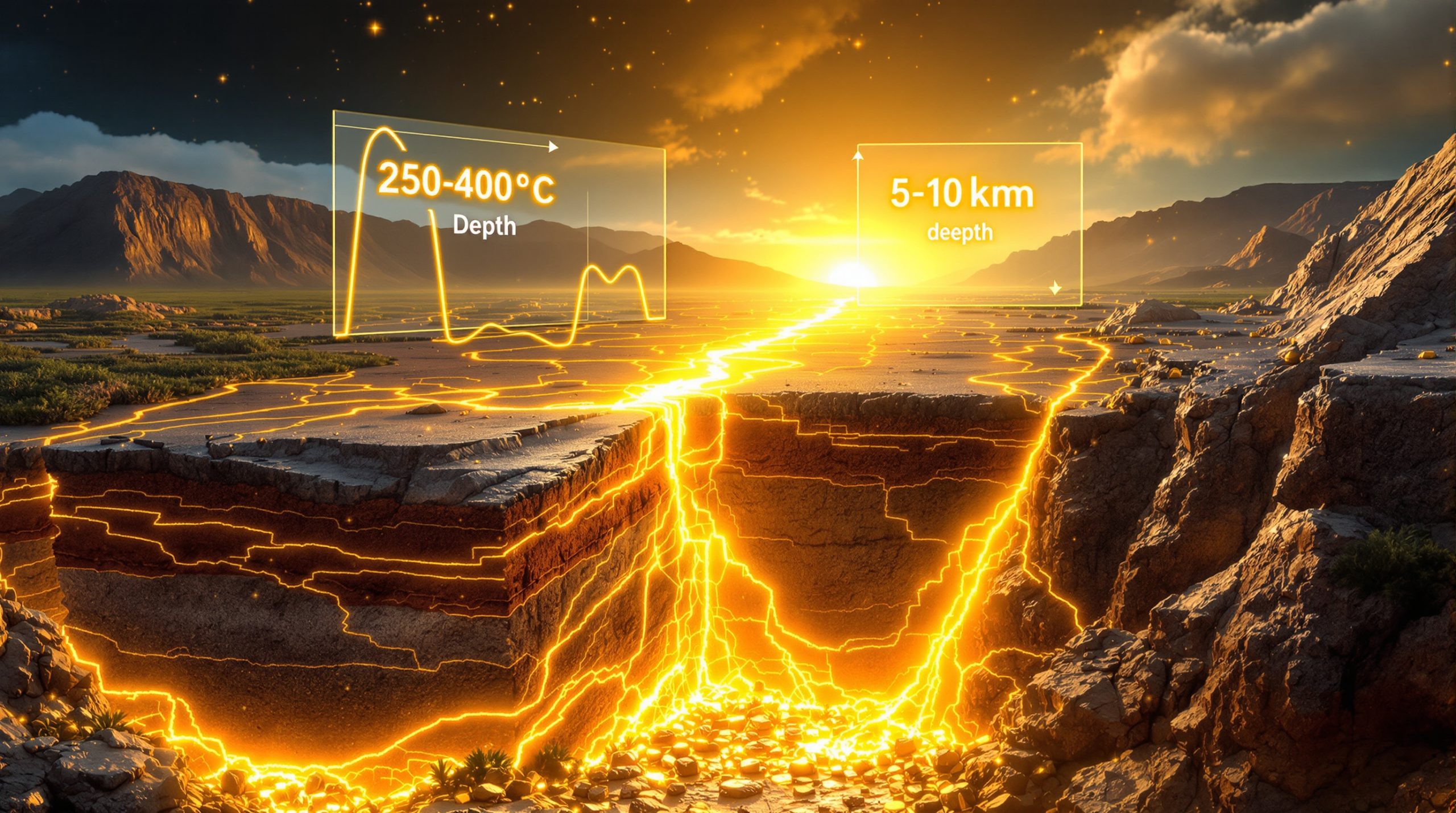Strategic Transformation in Critical Mineral Independence
Energy Fuels Inc. (TSX: EFR / NYSE: UUUU) has emerged as a cornerstone player in North America's pursuit of critical mineral self-sufficiency. The company's evolution from uranium-focused operations to a comprehensive Energy Fuels rare earth supply chain architect represents a fundamental shift in how Western economies approach strategic mineral security. This dual-commodity positioning addresses both immediate energy needs through uranium production and long-term technological independence through rare earth element processing.
The convergence of geopolitical tensions and clean energy transitions has created unprecedented urgency around domestic mineral processing capabilities. Furthermore, Energy Fuels occupies a unique position at this intersection, leveraging existing infrastructure and regulatory approvals to address supply chain vulnerabilities that have developed over decades of offshoring critical mineral processing to China.
Revolutionary Domestic Processing Infrastructure
White Mesa Mill: America's Strategic Asset
The White Mesa Mill in Utah stands as the only licensed facility in North America capable of processing monazite mineral concentrates into separated rare earth oxides. This facility holds dual licensing from the Utah Division of Environmental Quality and the U.S. Nuclear Regulatory Commission, providing the regulatory framework necessary for handling radioactive materials inherent in monazite processing.
Current Production Specifications:
• Phase 1 Capacity: 1,000 metric tons of neodymium-praseodymium (NdPr) oxide annually
• Expansion Targets: 4,000-6,000 metric tons with Phase 2-3 developments
• Heavy Rare Earth Timeline: Commercial production targeted for Q4 2026
• Strategic Coverage: Capability to produce six of seven oxides currently subject to Chinese export restrictions
The facility's monazite processing capability represents a critical breakthrough in Western supply chain independence. Moreover, monazite concentrates contain approximately 3-12% thorium content, requiring specialised handling expertise that Energy Fuels possesses through its uranium milling operations. This technical knowledge barrier has historically limited Western rare earth processing development, making the White Mesa Mill's operational status particularly significant.
Advanced Separation Technology Implementation
Energy Fuels employs sophisticated chemical separation processes that transform raw monazite concentrates into high-purity rare earth oxides meeting stringent manufacturing specifications. In addition, the Energy Fuels rare earth supply chain processing involves multiple technical stages:
Acid Digestion Phase: Monazite dissolution using hydrochloric or sulfuric acid systems to separate rare earth elements from gangue minerals
Thorium Isolation: Radioactive thorium separation and containment following NRC regulatory protocols
Selective Precipitation: Individual rare earth oxide separation through controlled crystallisation chemistry
Calcination Processing: Final oxide purification to achieve 99.5%+ purity levels required for permanent magnet applications
The company has successfully qualified its high-purity NdPr oxide for use in permanent magnet manufacturing applications. This represents a crucial milestone in establishing complete domestic supply chain control from raw materials to finished components, particularly relevant to current critical minerals energy transition initiatives.
Multi-Continental Feedstock Security Strategy
Diversified Supply Architecture
Energy Fuels has constructed a geographically diverse feedstock acquisition strategy that reduces dependency on any single supplier or region. This approach directly addresses concentration risks that have historically plagued Western rare earth supply chains.
| Feedstock Source | Location | Material Type | Annual Capacity Target | Development Status |
|---|---|---|---|---|
| Chemours Partnership | Florida/Georgia, USA | Monazite concentrates | 1,000-1,500 t NdPr oxide | Operational |
| Donald Project | Victoria, Australia | Heavy mineral sands | 7,000-8,000 t concentrates | Late 2027 target |
| Toliara Deposit | Madagascar | Monazite-bearing sands | Under assessment | Evaluation phase |
| Brazilian Operations | Brazil | Heavy mineral sands | Development pending | Planning stage |
The Chemours partnership represents an innovative circular economy application, transforming previously discarded phosphate production byproducts into valuable rare earth feedstock. However, this arrangement provides immediate operational feedstock while Energy Fuels develops international mining partnerships for long-term supply security.
Heavy Mineral Sands vs. Monazite Processing
The Donald Project in Australia introduces xenotime-bearing heavy mineral sands to the Energy Fuels rare earth supply chain, complementing existing monazite processing capabilities. Furthermore, xenotime contains significantly higher concentrations of heavy rare earths (dysprosium, terbium, yttrium) compared to monazite, addressing critical supply gaps in the most strategically important rare earth elements.
Processing Differentiation:
• Xenotime Chemistry: Requires different acid digestion and separation sequences than monazite
• Heavy REE Concentration: Contains 30-60% heavy rare earths versus 5-10% in monazite
• Supply Reliability: Production tied to established heavy minerals mining operations rather than chemical industry byproducts
Addressing Critical Supply Chain Vulnerabilities
Breaking Chinese Processing Monopoly
China currently controls approximately 85-90% of global rare earth processing capacity, creating significant strategic vulnerabilities for Western manufacturers. This concentration has increased despite growth in mining capacity in other regions, highlighting the critical importance of processing capabilities over raw ore availability.
Recent Chinese export control actions have demonstrated the weaponisation potential of rare earth supply chains:
• August 2023: Restrictions implemented on gallium and germanium exports
• July 2024: New export controls requiring government approval for rare earth processing exports
• September 2024: Graphite export restrictions expanded critical minerals export control strategy
The United States currently imports approximately 100% of refined rare earth oxides and has zero domestic processing capacity for rare earth separation outside of Energy Fuels' operations. Consequently, this dependency creates single-point-of-failure risks where geopolitical actions can disrupt supply chains for defence systems, electric vehicles, and renewable energy infrastructure.
Domestic Content Compliance Solutions
Energy Fuels' domestic processing capabilities enable manufacturers to meet increasingly stringent domestic content requirements across defence and clean energy sectors. The Energy Fuels rare earth supply chain provides:
Supply Diversification: Alternative sourcing to Chinese processors reducing geopolitical concentration risk
Regulatory Compliance: Domestic processing enables "Buy American" and critical minerals procurement regulation compliance
Supply Chain Transparency: Complete traceability from feedstock to finished oxides meeting defence sector requirements
Strategic Independence: Access to materials not subject to potential foreign export restrictions or trade disputes
These capabilities align with the broader critical minerals strategy being implemented across Western economies.
Financial Architecture and Investment Implications
Capital Deployment Strategy
Energy Fuels' $700 million convertible debt offering represents the scale of capital investment required to establish rare earth processing capabilities in Western markets. This financing structure provides operational flexibility during the ramp-up phase whilst offering future equity participation for investors.
Financial Structure Analysis:
• Convertible Terms: Balance immediate funding needs with future equity dilution management
• Revenue Projections: Analyst estimates suggest $553 million revenue potential by 2028, though these remain highly speculative
• Dual Commodity Exposure: Uranium sales provide cash flow stability during rare earth development phases
• Capital Intensity: Sustained market demand validation required to justify continued expansion investment
Market Volatility and Execution Risks
The rare earth markets exhibit significant price volatility driven by geopolitical factors, technological changes, and supply-demand imbalances. Energy Fuels' success depends on navigating these market dynamics whilst executing complex international project development.
Critical Risk Factors:
• Project Development Delays: International operations subject to permitting and regulatory approval timelines
• Cost Inflation Impact: Construction and operational costs affecting project economics
• Uranium Market Cyclicality: Base business cash flow fluctuations impacting rare earth investment capacity
• Multi-Jurisdictional Regulatory Complexity: Operations spanning Utah, Australia, Madagascar, and Brazil regulatory frameworks
This volatility is compounded by uranium market volatility affecting the company's base business operations.
Disclaimer: Revenue projections and financial forecasts mentioned in this analysis are speculative estimates based on company guidance and analyst models. Actual results may vary significantly due to market conditions, execution risks, and external factors beyond company control.
Geopolitical Catalysts and Strategic Positioning
Chinese Export Control Response Dynamics
Recent Chinese restrictions on rare earth exports have accelerated Western supply chain diversification initiatives. Energy Fuels' operational timing aligns with this geopolitical shift, potentially catalysing adoption of Western supply chains by manufacturers seeking supply security assurance.
The seven critical rare earth oxides subject to Chinese export controls include dysprosium, terbium, holmium, thulium, ytterbium, lutetium, and yttrium. Energy Fuels' claimed capability to produce six of these seven elements directly addresses the most strategically vulnerable supply chain segments.
Furthermore, the recent Critical Minerals Executive Order provides additional policy support for domestic supply chain development initiatives.
National Security and Defence Applications
Rare earth elements serve as critical components in advanced defence technologies, including missile guidance systems, radar equipment, and electronic warfare systems. The Energy Fuels rare earth supply chain addresses national security concerns about foreign dependency in critical defence applications.
The U.S. Department of Defense has identified rare earth processing capacity, not mining capacity, as the primary constraint on domestic supply chain security. Therefore, Energy Fuels' White Mesa Mill operations directly address this strategic bottleneck identified in the National Defense Strategy framework.
Technology Integration and Processing Excellence
Separation Process Innovation
Energy Fuels' monazite processing technology represents decades of accumulated knowledge in radioactive material handling and chemical separation processes. The company's institutional expertise in uranium milling provides crucial technical advantages in thorium management during rare earth processing.
Technical Differentiation Factors:
• Radioactive Material Expertise: Licensed handling of thorium-bearing monazite concentrates
• Process Optimisation: Chemical separation sequences adapted for North American regulatory frameworks
• Quality Control Systems: Specifications meeting permanent magnet manufacturing requirements
• Environmental Compliance: Processing systems designed for stringent Western environmental standards
These innovations are part of broader mining innovation trends transforming the industry landscape.
Manufacturing Specification Achievement
The company has developed quality control systems producing rare earth oxides at 99.5%+ purity levels required for high-performance permanent magnet applications. This technical capability differentiates Energy Fuels from simple mining operations, positioning the company as a complete processing solution provider.
Applications and End-Use Markets:
• Electric Vehicle Motors: NdPr oxides for permanent magnet motor manufacturing
• Wind Turbine Generators: High-performance magnets for renewable energy applications
• Defence Electronics: Precision applications requiring domestic supply chain control
• Industrial Automation: Advanced motor systems for manufacturing equipment
Competitive Landscape and Market Positioning
Western Alternative Development Context
While several Western companies are pursuing rare earth project development, Energy Fuels maintains a significant first-mover advantage through its operational processing facility. Most competitors remain in feasibility study, permitting, or early development phases.
Competitive Advantages:
• Operational Status: Only functioning monazite processing facility in North America
• Regulatory Approvals: Existing licences and environmental permits reducing development timeline
• Infrastructure Integration: Established uranium operations providing operational expertise and shared infrastructure
• Feedstock Security: Multiple supply agreements reducing input material risks
The Energy Fuels rare earth supply chain development occurs within a broader context of Western supply chain regionalisation initiatives, including European rare earth processing projects and Australian downstream integration efforts.
Technology Transfer and Knowledge Development
Energy Fuels' operations contribute to developing Western technical expertise in rare earth processing. Recent breakthroughs in permanent magnet production have demonstrated the company's ability to complete the entire supply chain from raw materials to finished components, creating knowledge spillovers benefiting the broader critical minerals sector.
Long-Term Market Transformation Implications
Supply Chain Regionalisation Acceleration
Energy Fuels' operational success could catalyse broader regionalisation of rare earth supply chains, with Western manufacturers increasingly sourcing from non-Chinese suppliers. This trend has potential to fundamentally reshape global rare earth trade patterns and pricing dynamics.
Market Transformation Indicators:
• Manufacturer Qualification: Western OEMs accepting non-Chinese rare earth sources
• Investment Flows: Capital deployment toward Western processing capacity expansion
• Policy Support: Government financing and regulatory support for domestic supply chains
• Technology Development: Innovation in separation processes and efficiency improvements
Electric Vehicle and Clean Energy Integration
The global permanent magnet market is projected to reach $15-18 billion annually by 2030, with neodymium-iron-boron magnets accounting for approximately 90% of high-performance applications. Electric vehicle drive motors represent the fastest-growing end-use segment with projected 30-40% compound annual growth rates through 2030.
Energy Fuels' positioning within this growth trajectory provides potential for significant market capture as Western manufacturers seek supply chain security for critical components. Energy Fuels' comprehensive approach to rare earth production positions them uniquely in this expanding market.
Investment Considerations and Market Outlook
Strategic Value Proposition Analysis
Energy Fuels' transformation into a rare earth supply chain leader represents both substantial opportunity and significant execution risk. The company's operational capabilities and strategic positioning address genuine market needs created by geopolitical supply chain vulnerabilities.
Investment Thesis Strengths:
• Operational Advantage: Functioning rare earth processing facility providing immediate market access
• Strategic Timing: Geopolitical conditions favouring Western supply chain development
• Market Growth: Clean energy and defence applications driving demand expansion
• Dual Revenue Streams: Uranium operations providing cash flow stability during rare earth ramp-up
Risk Assessment Considerations:
• Execution Complexity: Multi-continental project development and supply chain integration challenges
• Market Volatility: Rare earth price fluctuations affecting project economics and profitability
• Capital Requirements: Significant ongoing investment needed for capacity expansion and international development
• Competition Emergence: Potential for alternative Western supply chain development reducing market opportunity
Market Psychology and Investor Sentiment
The convergence of geopolitical tensions, clean energy growth mandates, and defence modernisation requirements creates favourable conditions for Western rare earth suppliers. However, investors should carefully evaluate the speculative nature of revenue projections and the complexity of executing integrated supply chain development across multiple jurisdictions.
Investment Timeline Considerations:
The Energy Fuels rare earth supply chain development represents a multi-year investment thesis requiring patience for project execution and market development. Near-term financial performance will likely remain dominated by uranium operations whilst rare earth revenues gradually scale toward projected levels.
Disclaimer: This analysis contains forward-looking statements and projections that involve substantial risks and uncertainties. Actual results may differ materially from projected outcomes due to market conditions, execution challenges, regulatory changes, and other factors beyond company control. Investors should conduct independent due diligence and consider their risk tolerance before making investment decisions.
The transformation of North American critical mineral independence through companies like Energy Fuels represents a fundamental shift in global supply chain architecture. Success in this transformation will depend on sustained execution, favourable market conditions, and continued geopolitical support for domestic supply chain development initiatives.
Looking to Capitalise on Critical Minerals Market Opportunities?
Discovery Alert's proprietary Discovery IQ model delivers real-time alerts on significant ASX mineral discoveries, instantly empowering subscribers to identify actionable opportunities in the critical minerals sector ahead of the broader market. Understand why major mineral discoveries can lead to substantial returns by exploring Discovery Alert's dedicated discoveries page, showcasing historic examples of exceptional outcomes, and begin your 30-day free trial today to position yourself ahead of the market.




